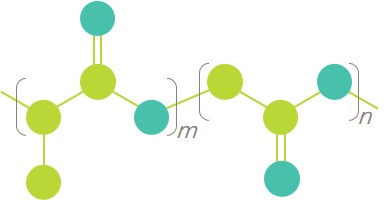polyesters

Today, synthetic aliphatic polyesters are perhaps the most extensively studied and utilized class of bioresorbable polymers in existence. These polymers contain an aliphatic ester bond in their backbone, whose linkages are hydrolyzed in aqueous environments making them biodegradable. Ashland manufactures a range of synthetic polyesters and co-polyesters from lactide, glycolide and caprolactone monomers, all under the brandname viatel™. The attractiveness of the viatel™ polyesters is that their degradation by-products are metabolized via the body’s natural pathways, making them inherently biocompatible and bioresorbable. As a result, these polyesters are used for parenteral controlled-release drug delivery, orthopedic fixation devices, tissue engineering scaffolds and wound healing dressings, among other biomedical applications. Viatel™ polyesters can be custom produced with defined chemical structures, molecular weight, inherent viscosities and selective terminal end groups such that their material properties and performance are ideal for their intended application.
related innovation



